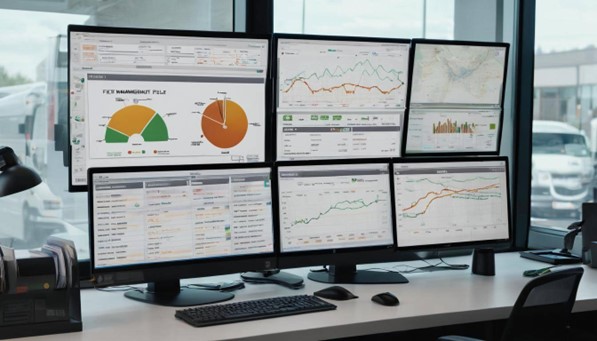Integrating fuel cards with fleet management systems enhances operational efficiency by providing real-time tracking of fuel expenditures, improving cost monitoring and fraud detection. This seamless integration allows fleet managers to analyze driving behaviors, reduce overall fuel costs, and gain insights into vehicle performance, ultimately leading to smarter decision-making and enhanced sustainability in fleet operations.
Managing a fleet involves constant vigilance over expenses and operational efficiency. Unexpected fuel costs and time-consuming manual tracking often add to the stress. This is where integrating fuel cards with existing fleet management systems comes into play. It offers a solution by providing real-time data access and significant cost savings while streamlining processes.
Choosing the right fuel card provider is essential to maximizing these benefits. From evaluating network reach and discounts to assessing reporting tools and customer service, this article dives into what makes a provider stand out. Enhanced security features and advanced analytics are just some of the factors that ensure compatibility and profitability for your fleet operations.
Picking the Right Fuel Card Provider
One essential factor to consider is the fees and discounts associated with each card. Different providers have various fee structures, including monthly fees, transaction fees, or fees for exceeding specific mileage limits. Understanding these costs upfront can save your fleet from unpleasant surprises down the road.
Additionally, many fuel cards offer attractive discounts that can help you offset fuel expenses significantly. Some card providers may even offer up to a 5% discount on fuel purchases or rebates for frequent use, which could make a considerable difference in your overall budget, especially for larger fleets.
Another critical aspect worth examining is the reporting tools provided by the card issuer.
In today’s fast-paced world, data analytics is pivotal in effective fleet management. Fuel cards equipped with robust reporting tools allow you to track fuel consumption patterns, monitor spending trends, and pinpoint areas where savings can be realized. Access to detailed analytics means you’re better equipped to make informed decisions regarding fuel usage and driver behavior.
Reports that break down spending by vehicle or driver can also highlight inefficiencies that might otherwise go unnoticed. Good reporting tools are like having a financial advisor guiding you on the best ways to optimize your fleet expenses.
Lastly, let’s talk about customer service support—a vital piece of the puzzle often overlooked in the selection process.
When issues arise, whether it’s an unauthorized transaction or difficulties using a fuel card at a station, responsive customer service can save time and valuable resources. Providers who prioritize customer support usually have dedicated teams available to quickly address any concerns. Quick resolutions ensure that your drivers spend less time worrying about their cards and more time on the road.
Look for testimonies regarding service responsiveness; doing so can provide insight into what you can expect if issues arise during your engagement with the provider.
As you evaluate different options, remember that understanding the implications of fees, harnessing data analytics for insights, and ensuring solid support are key elements that shape your decision-making process moving forward.
Essential Features for Fleet Management
When considering fuel card integration, several essential features stand out as vital tools for modern fleet management systems. One key feature is real-time tracking, which allows you to monitor fuel transactions as they happen. Imagine being able to address discrepancies immediately rather than waiting days or weeks to recognize an issue. This immediate awareness not only saves time but also helps maintain budget accuracy and trust within your team.
Advanced Reporting
Equally important are advanced reporting capabilities. These allow fleet managers to compile extensive data into comprehensive reports, aiding in effective decision-making. By benchmarking costs against industry standards, you can identify inefficiencies that impact your bottom line. For instance, Verizon Connect provides detailed fuel usage reports that can be customized to your specific needs, offering insights that lead to substantial savings when properly utilized. Having the right metrics at your fingertips empowers you to make informed adjustments in real-time, potentially changing your fleet’s financial landscape for the better.
Security Features
In any fleet organization, security is paramount. It’s critical to implement fraud detection features to protect against theft and unauthorized purchases. Look for systems that alert managers of abnormal transactions—like excessive fuel purchases that might exceed tank capacity or unusual transaction timings—that could signal fraudulent activity. A proactive approach here is essential; evaluating these features during the selection process ensures you’re safeguarding both assets and resources effectively.
Beyond this protective layer, additional benefits arise from streamlined operations and increased compliance with regulations. Staying informed about your fleet’s activity enables a higher level of accountability among drivers and improves overall safety standards throughout the organization.
Integrating these essential features further enhances your ability to optimize costs, ultimately shaping a more efficient operational framework. Moving forward, it’s crucial to understand how seamless connections between your systems can enrich this strategy.
Seamless Data Integration
Achieving seamless data integration is not merely a convenience; it’s a transformational shift in how fleet operations are managed. By ensuring that systems communicate effectively, businesses can harness the full potential of their data. It eliminates the common pitfalls associated with manual tracking, such as human error and data discrepancies, which can lead to costly mistakes.
This interconnectivity enables real-time access to vital information, giving fleet managers a clearer picture of operations and allowing for more informed decision-making.
Integration Platforms
Various fleet management solutions support integration with fuel cards, making it easier than ever to collect crucial data. For example, platforms like Verizon Connect have carved a niche for themselves in the market through their strong compatibility with well-known fuel card providers, such as WEX Inc. and Fuelman.
These integrations are designed to streamline processes by automating data transfer—saving time while increasing efficiency. The benefits are significant: industry studies indicate that seamless integration can reduce administrative overhead by 30%. Think about what that means for your organization—less time spent on paperwork and more focus on strategic initiatives.
Automated Data Entry
Imagine switching from keeping a handwritten ledger to employing a fully automated financial system; that’s the kind of leap we’re talking about when we refer to automated data entry within fleet management systems. This analogy beautifully captures the essence of automation—it minimizes human error while significantly speeding up data processing.
With automated data entry, every transaction captured through your fuel card is instantly logged into your system without any manual input required. This not only saves precious hours each week but also ensures that records remain accurate and up-to-date.
In essence, these tools create an ecosystem where technology complements human oversight, allowing fleet managers to allocate their resources where they’re most needed—making smarter business decisions rather than chasing numbers.
When organizations embrace seamless data integration and automated systems, they step into a proactive approach towards fleet management. They can tap into actionable insights derived from rich datasets without tedious reconciliation processes weighing them down. Consequently, this empowerment fosters an environment where innovation thrives—and ultimately leads to smarter cost-saving strategies across the board.
Enhancing Operations Through Data
Access to detailed data is not just an enhancement; it’s a transformation in how fleet management operations are conducted. Utilizing comprehensive datasets allows fleet operators to streamline processes, leading to optimal performance. Fuel consumption reports are invaluable tools that enable companies to identify inefficiencies in their routes and schedules. By analyzing these reports, managers can pinpoint exactly where fuel is being wasted and make adjustments accordingly.
Data-Driven Decisions
A practical example comes from Veterans Towing, which adopted integrated fuel management systems. This approach led to an impressive 15% reduction in its fuel usage. Such outcomes highlight the necessity of making data-driven decisions; here is the essence of operational excellence. The analytical capability offered by modern technologies allows for precise adjustments that were hardly measurable before, ensuring every drop of fuel yields maximum output.
Monitoring Driver Behavior
Another critical aspect revolves around monitoring driver behavior through telematics data. Every detail—from acceleration rates to idle times—offers insights into how individual drivers operate their vehicles. Prolonged idling or instances of speeding can lead to unexpected increases in fuel consumption. Interventions based on this data can lead to corrective actions such as targeted training sessions for drivers, helping them adopt safer and more efficient driving habits.
Reducing Carbon Footprint
Implementing eco-driving programs remains an important initiative guided by the insights derived from collected data. These programs focus on teaching drivers how to operate their vehicles efficiently while being mindful of their environmental impact. As organizations refine their practices around sustainability, they achieve the dual advantage of cost savings and enhanced corporate responsibility towards the environment.
Recognizing these benefits sets the stage for exploring further strategies that contribute to fiscal health within fleet operations, enabling businesses to thrive even amid economic pressures.
Cutting Costs with Efficient Management
One of the most significant ways to streamline expenses is through fuel-efficient route planning. By leveraging data obtained from fuel cards, fleet managers can devise optimal routes that minimize fuel consumption. Companies like Geotab offer innovative features to analyze driving patterns and recommend paths that cut fuel usage by as much as 12%.
Imagine a scenario where a driver, instead of taking the traditionally busy route, receives real-time information about traffic conditions and detours that not only save time but also conserve fuel. This proactive approach lowers operational costs and reduces wear on the vehicle, leading to less frequent repairs.
Of course, fuel-efficient routing is just a part of the equation; another crucial aspect lies in maintaining the health of your vehicles.



